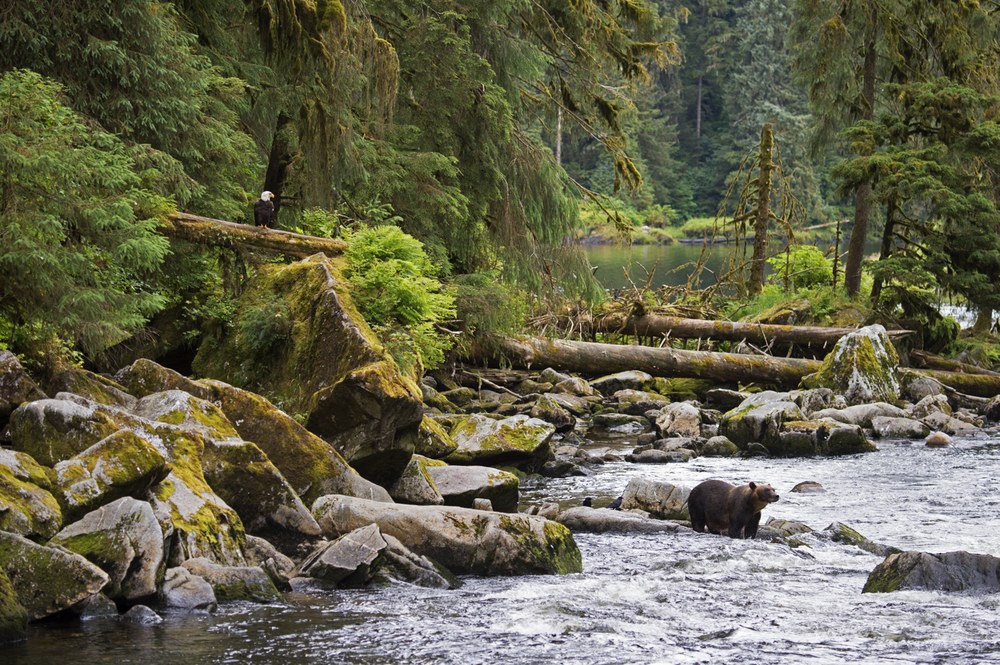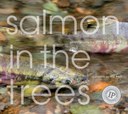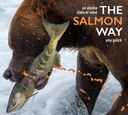
Over the years, we’ve been on a long journey to protect ancient, old-growth trees in Southeast Alaska’s Tongass National Forest. Our community has answered our calls to action time and time again because it understands that protecting Roadless Areas in Alaska sets a strong precedent for protecting backcountry places in Washington State and beyond. Last week, the administration finalized protections for the Tongass, securing a much-anticipated win for conservation, climate, and Indigenous communities.
Victory for the Tongass
In 2021, the Biden administration honored its pledge to reinstate Roadless Rule protections for the Tongass by announcing plans to roll back the exemption put in place by the previous administration. While considering a final course of action, the Forest Service received more than 110,000 comments from individuals and organizations. The Mountaineers and our partners submitted final comments underscoring why restoring these protections is critically important, and many of you added your voice to this important campaign.
The recently released final rule restores long-standing protections from logging and road building for 9.37 million acres of Roadless Areas in the world’s largest intact temperate rainforest.
During the final phase of the process to produce this policy, the Forest Service analyzed and solicited feedback on six potential courses of action. One course of action proposed restoring protections for all of the Tongass’s Roadless Areas. Another proposed upholding the complete Roadless Rule exemption instituted by the previous administration, which would leave old-growth vulnerable to additional timber harvests and roadbuilding. Four additional alternatives that included differing levels of additional timber harvests in Roadless Areas were also considered.
The majority of the 112,000 letters received during the final public comment opportunity, including many from the conservation and recreation communities, were in favor of full reinstatement of Roadless protections. The Forest Service also consulted with Southeast Alaska Tribal Nations throughout the process to re-evaluate Roadless protections for the Tongass.
This victory helps preserve the important ecological, economic, and cultural value of Southeast Alaska, while supporting local communities. It also signals progress toward more robust consultation with Tribal Nations by the federal government, something that will contribute to lasting progress for Indigenous communities in Alaska and across the U.S.
A Special Forest
The Tongass’s 16.7 million acres make up 80% of Southeast Alaska. As federally managed public land, the Tongass belongs to everyone and matters beyond Alaska. Maybe you’ve had the opportunity to visit - or even live in - Alaska and experience the beauty and wonder of the Tongass National Forest up close. Protecting these wild areas from development protects the many benefits of world-renowned backcountry recreation and tourism in Southeast Alaska.
The Tongass’s nickname “America’s climate forest” isn’t just a catchy moniker. The Tongass contains nearly one third of all that remains of the world’s rare old-growth temperate rainforest. The ancient trees in the Tongass combat climate change, storing 8% of the carbon captured on National Forest lands across the entire country. Logging in the Tongass risks releasing centuries’ worth of greenhouse gas emissions into the atmosphere that would complicate our current effort to curb carbon emissions.
The Roadless Rule is an important conservation tool that protects many of our most valued backcountry areas from logging and road building. In addition to the Tongass, other Roadless Areas can be found across Washington State, including in the Washington Pass and Liberty Bell areas.
Sparking Advocacy with a Book
In addition to our collective advocacy and participation in the federal rulemaking process, our publishing division played an important role in the campaign to protect the Tongass. Mountaineers Books and their conservation imprint, Braided River, have deep roots in protecting nature through visual storytelling. Through comprehensive, immersive images they transport readers and audiences to wild and beautiful places and inspire conservation action to protect them.
Several Mountaineers titles and their accompanying impact campaigns, including Amy Gulick’s Salmon in the Trees: Life in Alaska’s Tongass Rainforest and The Salmon Way: An Alaska State of Mind, have raised awareness for the importance of protecting the old-growth forests, Indigenous homelands, communities, and wildlife of the Tongass and Southeast Alaska.
Through partnerships with the U.S. Forest Service and Alaska-based and national grassroots organizations, Braided River books, events, and exhibits illuminated the relationship between people and salmon in Alaska and the unique importance of salmon to economies and spiritual well being.
"Reinstating the Roadless Rule protections for the Tongass is a big win for all of us. Our largest national forest plays an outsized role in regulating global climate for human and wild communities worldwide. I’m grateful that we’re taking care of what takes care of us,” shared Amy Gulick, photographer and author of Salmon in the Trees.
Permanent Protection for Roadless Areas
While the Roadless Rule does not permanently protect the Tongass, it ensures the near-term protection of this spectacular landscape and sets the stage for more permanent protection by Congress. Without permanent protection, we risk policy changes by a future administration that could threaten our ancient forests and the many benefits they provide.
We can achieve permanent, legislative protection for our National Forest’s Roadless Areas by passing the Roadless Area Conservation Act - a bill championed by Sen. Maria Cantwell (D-WA). This legislation would permanently protect 58.5 million acres of forest lands currently protected under the Roadless Rule, more than 31% of the National Forest system. We’ll keep you updated on pending bill re-introduction, progress, and future ways to engage on this important issue during the 118th Congress.
 The Mountaineers
The Mountaineers

